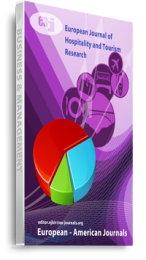The study analysed the influence of tourism infrastructure on community transformation in Southwest Nigeria. One most prominent tourism destination was purposively selected from each state of six; Oyo – Agodi Gardens, Ogun – Olumo Rock, Osun – Osun Osogbo Groove, Ondo – Idanre Hills, Ekiti – Ikogosi Warm Springs, and Lagos – National Theatre. Simple random sampling technique was employed to select thirty residents from each destination, giving a total of one hundred and eighty respondents. The results revealed social factors had Cronbach’s Alpha values of social (0.799) with variance 10.310%; political factors (.811) with variance 9.237%; natural factors (0.781) with variance 9.103%; economic factors (.614) with variance 10.117%; physical factors (.749) with variance 10.312%; human factors (.721) with variance 10.003%; and cultural factor (.611) with variance explained as 9.041%. The results further revealed that social capital (B = 0.164; p<0.05); physical (B = 0.174; p<0.05); human (B = 0.184; p>0.05); and natural capital (B = 0.159; p<0.05) showed significance with community transformation. While, economic capital (B = 0.113; p>0.05); political factors (B = 0.181; p>0.05); and cultural factor (B = 0.130; p>0.05) showed no significant prediction but all had t values greater 1. Infrastructure capitals (social, physical, and natural) were found to have significant relationship with community transformation. It is recommended that infrastructure capital should be set up as a ‘service industry’ to providing goods that meet customers’ demands in order to forestall irregularities and delay in supply for rapid and optimal sustainable transformation.
Keywords: Community, Tourism Destination, Tourism Development, community transformation, infrastructure capital

